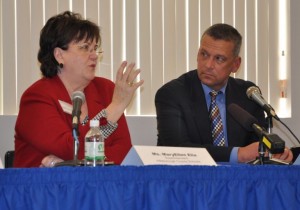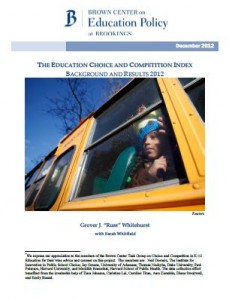For their project, Gussie Lorenzo-Luaces and three classmates at Deer Park Elementary in Tampa, Fla., wanted to find out what kind of paper allows a paper airplane to fly the farthest. After five trial runs, they determined copy paper, with its smooth surface and stable weight, worked best.

Gussie Lorenzo-Luaces, a third-grader at Deer Park Elementary School in Tampa, was one of more than 2,000 students participating in the 33rd annual Hillsborough Regional STEM Fair last week.
The boys’ exhibit was among more than 1,800 presented at last week’s 33rd annual Hillsborough Regional STEM Fair, which featured 2,000 students from district schools, charter and private schools, and home schools.
That diversity was a big plus for Gussie’s mom, Susie, who was curious where other students in the county registered on the science track.
“I just feel they don’t need separation,’’ she said. “I like seeing them all together.’’
Increasingly, though, Hillsborough students are not all together in academic competitions.
In the past year, district officials have begun excluding charter schools from some districtwide contests, including Battle of the Books, a reading competition, and the Math Bowl and Math League for elementary and middle school students.
The reasons for the splintering are not clear. But everything from cost, to fear of competition, to a desire for charter schools to be more independent, has been suggested. At the least, the move points to potential pitfalls as school choice options mushroom across the landscape – even in a district with a choice-friendly reputation like Hillsborough.
“They’re all our children,” said Lillia Stroud of King’s Kids Academy of Health Science, a new charter in Tampa. Stroud said she can relate to the district’s concerns, but “separation at any level is disheartening.” (more…)
Florida state Sen. John Legg has a slogan ready for a bill he plans to file next week: “It’s not your daddy’s vo-tech.’’
The bill will focus on “high-end, high-skilled industry certifications at the high school level,’’ with one plank calling for some certifications to fulfill certain high school graduation requirements, said Legg, R-New Port Richey, who chairs the Senate Education Committee.
The certifications won’t replace any requirements, but serve as substitutions, he said. The idea is to put students on the fast-track for high-tech jobs that help grow the economy.
“Career education has changed since 1982,’’ Legg said. “It’s evolved. We’re trying to get the jobs back that we had in 2003, but we have failed. They’re not coming back, so we’ve got to train for jobs in 2023.’’
The bill, which is still being drafted, is part of a “very large package concerning career and technical education that will become a high priority for the senate,’’ he said.
It complements another bill Legg filed last month that would create “STEM zones” in counties with state universities that have high levels of research activity. Legg is looking primarily at the University of South Florida in Tampa.
Senate Bill 192 calls for partnerships between the Department of Education and Workforce Florida to build a gateway to science, technology, and engineering or mathematics careers.
The zones would create education hubs, not only looking to higher education facilities to train adults, but inviting traditional K-12 schools - as well as charters and private schools - to develop innovative curriculum for students and a pipeline of highly-skilled workers. In return, the schools would receive incentives, such as tax credits, expedited permits or grants, Legg said. (more…)
Editor’s note: Hillsborough Superintendent MaryEllen Elia was also part of the National School Choice Week event in Tampa yesterday that featured Florida Superintendent Tony Bennett, and her remarks at the all-boys magnet school may have been even more noteworthy. Hillsborough is the eighth biggest school district in the nation. Here is the heart of Elia's comments, edited slightly for length and clarity.
The parents of the young men choose to send their sons here. They want their sons to be here. And I know I’m preaching to the choir when I talk about choice, but I think choice is one of the best things about education and should be embraced by all. Woe to all of us if we have to face a world where everyone is the same. …
So one of the things that I think that’s really important, that most of you probably don’t know, is that Hillsborough County has almost 50,000 students that are in some school by choice. So think about that. We’re about 200,000, so 25 percent of our students have chose another school than what would normally be their assigned school. We think that’s important. Obviously you do, right? And I think one of the things we have to do, in generally in reform in education – and again, I’m probably speaking to the choir here – but I think the concept of choice needs to be an integral part of the reform movements we have. So not only students, but also teachers, have choice in the kinds of approaches they take in the classroom.
I want to give you an example. You might not know this, but I started magnet schools, which were really our first choices in Hillsborough County, in 1989. And I was trying to convince parents that a computer was something their child probably would want to learn how to use. … We did a presentation in Hillsborough High School’s auditorium (about a new magnet school) … and a parent said to me, ‘My child will never have to use a computer. Never. So why would I send them to this little elementary school that is down close to downtown when I don’t live there? ’ And I said, ‘Well, what does your child like?’ And she said, ‘They like dinosaurs.’ I said, ‘If every book your child read for the next three months was about dinosaurs, would he be a better reader?’ And she said, ‘Yeah, he eats and sleeps and talks dinosaurs all the time.’ And I said, ‘You want him to really be a good student, you give them the things that they like. Believe me, kids like technology.’ We filled the school that year, and we have since gone on to have … over 35 magnet schools.
The big issue is, no child’s the same. And we’ve got to make sure that we can meet those needs of children and teachers, and teaching the things and learning the things the way they are going to be most successful. So in my world, interest is a huge, huge push for kids. … (more…)
Florida’s new education commissioner is known for his zealous support of charter schools and vouchers and other learning options that some critics see as anti-public school.

Florida Education Commissioner Tony Bennett and Hillsborough Superintendent MaryEllen Elia were among the panelists at a National School Choice Week event in Tampa. (Photo by Lisa A. Davis/Step Up For Students)
But on Tuesday afternoon, Tony Bennett sat next to Hillsborough County Public Schools Superintendent MaryEllen Elia inside a Tampa magnet school for boys, and praised the growth of choice in district schools across the state.
Florida is transcending the first round of conversations on choice that pit private and charter schools against public schools and virtual schools against “brick and mortar’’ ones, Bennett said during an event marking National School Choice Week. The new conversation, he suggested, isn’t either-or; it’s whatever works to ensure all kids have access to quality choices.
“So we’re now talking about choice – not just private schools and charter schools and virtual schools – we’re talking about public school choice,” he told an audience of about 100 people gathered at the Boys Preparatory Academy. “We’re talking about creative leaders like MaryEllen, like the team here, creating educational opportunities for children within the district - and really going to what we all heard was the purpose of choice to begin with, to provide incubation for innovation for our public schools.”
Tuesday’s event was sponsored by the Florida Alliance for Choices in Education, a coalition that includes a wide swath of school choice groups. Bennett and Elia sat on a panel with representatives from home-schooling, virtual education, magnet schools, career academies, Florida tax credit scholarships and McKay scholarships.
Most were parents who had lived and breathed school choice, starting with their own children. As they shared stories of searching for schools that practiced their faith or fit their child’s academic needs, they offered numbers that shed light on the choice movement’s impact. (more…)
 The Miami-Dade school districts ranks No. 10 among school districts nationwide in providing a wide array of school choice options for its students, according to a national report released today.
The Miami-Dade school districts ranks No. 10 among school districts nationwide in providing a wide array of school choice options for its students, according to a national report released today.
The Brookings Institution used its "Education Choice and Competition Index" to score more than 100 districts nationwide, using a complicated formula based on 13 categories. Among other factors, it looked at whether alternatives were available, including magnet schools, charter schools, virtual courses, vouchers, tax credit scholarships and affordable private schools.
The Recovery School District in New Orleans came in at No. 1, and earned the report's only A grade. (Miami-Dade got a B-.) New York City, Washington D.C., Minneapolis and Houston rounded out the Top 5.
A number of Florida school districts rated relatively high, including Hillsborough and Pinellas (tied at No. 19) and Broward and Duval (tied at No. 22).
The No. 10 ranking for Miami-Dade, which just won the Broad Prize for student progress, shouldn't be a surprise in Florida. As we've noted before, the district offers a substantial number of options on its own, through magnets and career academies, and, among the state's biggest districts, has some of the highest rates of students attending charter schools and private schools via tax credit scholarships.
It also has a superintendent, Alberto Carvalho, who said this a few months ago: "We are now working in an educational environment that is driven by choice. I believe that is a good thing. We need to actually be engaged in that choice movement. So if you do not ride that wave, you will succumb to it."